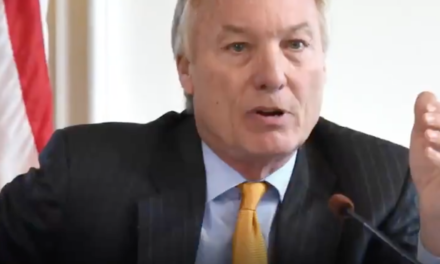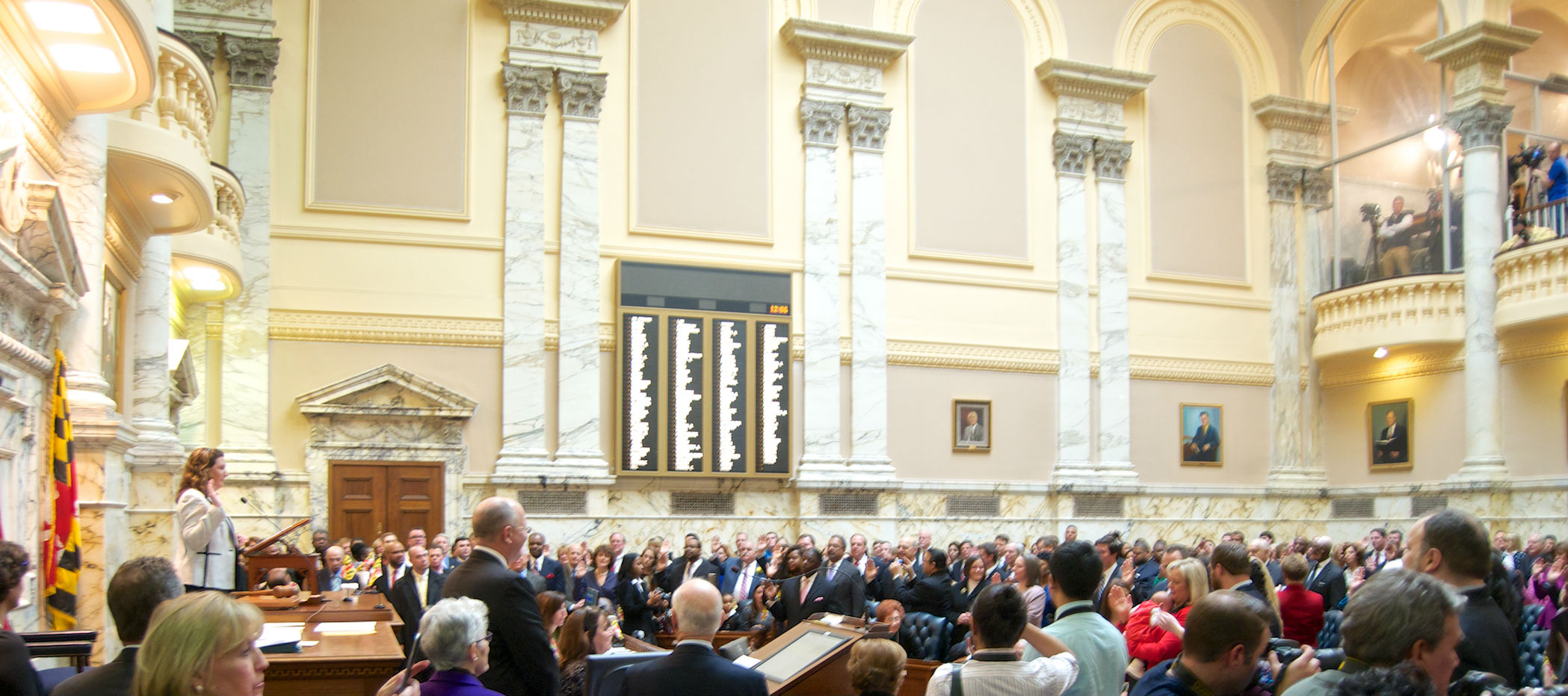By Len Lazarick
Len@MarylandReporter.com
Did you hear the story about the rabbi and the swami?
Actually it wasn’t a rabbi, as the story was first told, but a celibate swami who asked for help in keeping his distance from the women in the Senate chamber last week. Since Maryland Senate officials wouldn’t accommodate him, the Hindu swami sent a deputy to chant the opening prayer in the chamber Wednesday.
For the first time, the proceedings were opened with ancient prayers chanted in Sanskrit by a Hindu priest.
“I think we’re all better for that experiment,” said Senate President Mike Miller. “We have to understand and appreciate all cultures.”
The two chambers of the General Assembly handle their opening prayers differently, but both tread lightly and work creatively as they look to balance the spirituality of their members, the diversity of the population and the separation of church and state.
This state was the home of Madelyn Murray O’Hair in 1960 when she sued the Baltimore City Public School System; it became a lead case in the U.S. Supreme Court ruling that eliminated prayer in public schools. But Maryland’s elected leaders invoke God on a daily basis.
“I’ve prayed more in the Senate in the last three years than I have in the whole rest of my life,” said first-term Sen. Jamie Raskin of Takoma Park. When he’s not legislating, Raskin is a professor of constitutional law at American University specializing in First Amendment issues.
Raskin pointed to a 1983 decision of the U.S. Supreme Court in Marsh v. Chambers.
“There can be no doubt that the practice of opening legislative sessions with prayer has become part of the fabric of our society,” Chief Justice Warren Burger wrote. “To invoke Divine guidance on a public body entrusted with making the laws is not, in these circumstances, an ‘establishment’ of religion or a step toward establishment; it is simply a tolerable acknowledgment of beliefs widely held among the people of this country.”
The decision, which upheld Nebraska’s practice of a hired chaplain in its legislature, was heavily based on the actions of the first Congress. That body comprised some of the Constitution’s framers and they had voted to hire a chaplain to give a daily prayer.
If there is to be prayer, “it should be open to all perspectives,” Raskin said. “We should celebrate the pluralism of beliefs,” like those of the secular humanist and others he’s invited to give the invocation.
They join a long line of priests, bishops, ministers, deacons, elders, rabbis and others of both sexes who have led the Senate in prayer. To avoid offense to those of other faiths, the Senate staff sends speakers language from a brochure on “public prayer in a diverse society” put out by the National Conference of Community and Justice (formerly the National Conference of Christians and Jews.)
“Inclusive public prayer seeks the highest common denominator without compromise of conscience,” says the article. It “uses universal, inclusive terms rather than particular proper names for divine manifestations.”
In other words, it doesn’t pray “in Jesus’ name.” To a great extent the Christian clergy of many denominations do not, as the prayers from last year’s Senate journal testify, though there is the rare slip.
In most cases, the clergy men and women will pray “in your holy name.”
It was both the persistent use of Jesus’ name and the prayers for specific bills and causes that led the House of Delegates to stop inviting clergy altogether almost 10 years ago.
“They were making their prayers politically-oriented,” said House Speaker Michael Busch, then a committee chair. A few delegates were also slamming down their desk tops in protest when the clergy invoked Jesus.
The House now begins every session with the Pledge of Allegiance – the secular prayer to our almost sacred symbol of “one nation under God.” A different delegate each day offers a prayer, sometimes from other sources, some very personal.
“It’s a good bonding point,” Busch said. “It has turned out to work very well.”
For instance, Del. Melvin Stukes on the Friday before the Ravens playoff game (Jan. 15) gave a stirring rendition of “The Fellowship of the Unashamed.”
But Stukes substituted “the Almighty” and “God” for the three references to “Jesus” and “Christ” in the original.
“We try to pay respect to the other members in here,” said Stukes, who attends a small Bible study group in the House office building each Friday. “It doesn’t serve any purpose to offend anybody.”
Sometimes the prayers are a source of humor as well, as when the Rev. Roger Carlson of Asbury United Methodist Church in Arnold asked the Lord to give Senate President Miller “a large dose of wisdom, of guidance and of patience.”
Hearing a stirring from the floor, Carlson said, “Do I hear an amen?” to which the senators responded with a loud chorus of “Amens.”
“Uh oh,” said Carlson.
Miller was amused.
“I hope someday somebody will give me wisdom and patience sometime before I die,” Miller said. “I know there are some senators who have asked for the same thing and their prayers have gone unanswered.”





Recent Comments